May
22
2020
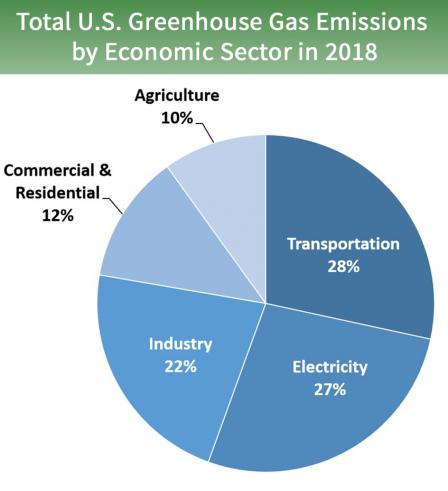 Here is a tiny bit of good news on the climate change front: A new analysis finds that there is more than enough storage space globally to fit the carbon we would need to capture and store if we wish to meet our climate change goals. The found:
Here is a tiny bit of good news on the climate change front: A new analysis finds that there is more than enough storage space globally to fit the carbon we would need to capture and store if we wish to meet our climate change goals. The found:
No more than 2700 Gt of storage resource is required under any scenario to meet the most ambitious climate change mitigation targets.
Meanwhile current estimates of global carbon storage capacity are around 10,000 Gt. This does not mean we will meet our targets, it only means that global carbon storage capacity will not be a limiting factor. It’s always fun to learn that something you didn’t even know was a problem turns out not to be a problem anyway. But let’s break this down a bit.
The study modeled climate change mitigation scenarios using different assumptions about reducing fossil fuel use, increasing renewable energy, electrifying the transportation sector, energy efficiency, and carbon capture. They ran 1,200 different scenarios through the simulation, and found that under any scenario the maximum amount of carbon storage that would be necessary to meet the goal of no more than 2 C warming is 2,700 Gt. How much storage we would actually need, however, varied considerably based upon the other details. Specifically, the faster we ramp up carbon capture and storage (CCS) the less storage space we will ultimately need. The longer we wait, the harder it will be, and the more we will need to make up for lost time with CCS.
Also, like many resources, space for CCS varies in terms of convenience and cost. The more space we need, the more we will have to rely upon the less and less efficient storage space. So the longer we delay climate mitigation, the harder it will get.
Continue Reading »
Dec
30
2019
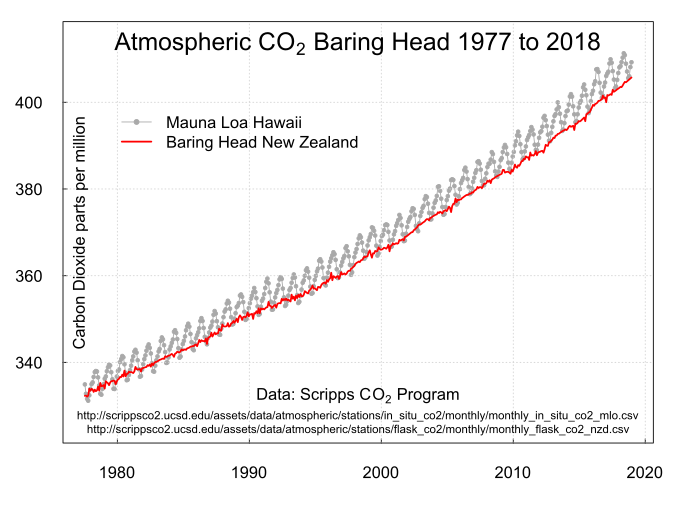 It’s fun and interesting to look back over the last decade and think about what has happened and how far we have come. Round years are arbitrary, but it’s a sufficient trigger to take stock and hopefully gain some perspective on the medium course of history. There is a lot to say about the 2010s, and I may take the opportunity to say more, but I want to discuss in this essay what is perhaps our greatest challenge and disappointment over the last decade. In many ways this has been a lost decade for climate change mitigation.
It’s fun and interesting to look back over the last decade and think about what has happened and how far we have come. Round years are arbitrary, but it’s a sufficient trigger to take stock and hopefully gain some perspective on the medium course of history. There is a lot to say about the 2010s, and I may take the opportunity to say more, but I want to discuss in this essay what is perhaps our greatest challenge and disappointment over the last decade. In many ways this has been a lost decade for climate change mitigation.
Over the last decade the scientific evidence (and resulting consensus) that the planet is warming, that humans are the primary driver of this trend, and that the consequences are not likely to be good, has only become greater. The last five years have been the hottest five years on record, and this has been the case for most of the last decade. The year 2016 was the hottest, because it was an El Niño year (short term fluctuations will still be overlaid on top of the longer term trend) but the trend is unmistakable. The story of the world’s ice is more complex, with greater regional and year-to-year variations, but total global ice has been decreasing, and if anything accelerated over the last decade. The Greenland ice sheet in particular experienced accelerated melting. As a result there is a real and growing scientific consensus, north of 97% among relevant scientists, that anthropogenic climate change is happening.
We are also experiencing more extreme weather events. We are seeing more droughts, fires, heat waves, and more powerful storms. In the last decade it become clear that, while the worst consequences of climate change are decades and even centuries in the future, we are starting to see real consequences now.
Economists have started to weigh in as well. Numerous studies were published over the last decade, concluding that – climate change will cost the world many billions of dollars and will reduce economic growth, costing even more. Further, the option of allowing climate change to happen and adapting to the results will likely be the costliest option. In addition to the monetary cost, there is a quality of life cost. Extreme weather causes displacement, psychological trauma, and social upheaval. If you think we are having a refugee crisis now, just wait as flooding increasing and more locations become essentially uninhabitable.
Continue Reading »
Sep
24
2019
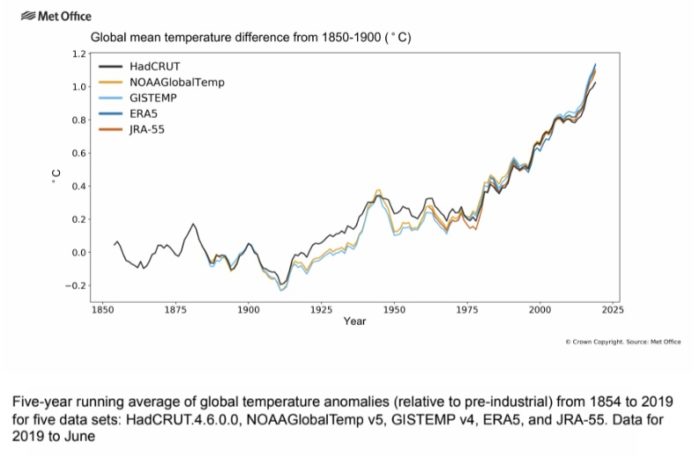 Have you ever traveled with a large group of friends? When a group gets beyond a certain “critical mass” it becomes geometrically more difficult to make decisions. Even going to a restaurant or a movie become laborious. Decision making seems to break down in large groups, especially if there isn’t an established hierarchy or process in place. That’s why the “by committee” cliche exists – group decision making can be a highly flawed and problematic process.
Have you ever traveled with a large group of friends? When a group gets beyond a certain “critical mass” it becomes geometrically more difficult to make decisions. Even going to a restaurant or a movie become laborious. Decision making seems to break down in large groups, especially if there isn’t an established hierarchy or process in place. That’s why the “by committee” cliche exists – group decision making can be a highly flawed and problematic process.
I can’t escape the nagging sensation that the world is having this problem. We seem to be politically frozen and unable to take decisive timely action. We are metaphorically driving toward a cliff, and we can’t even take our foot off the accelerator, let alone apply the brakes.
I am talking, of course, about climate change. The World Meteorological Organization (WMO) compiled data in preparation for a UN summit on climate change in New York (which the US will not, ironically, be attending). They found:
- 2014-2019 are the hottest 5 years on record
- Global temperature have risen by 1.1 C since 1850, but 0.2 C between 2011-2015.
- CO2 release between 2014-2019 was 20% higher than the previous 5 years
- Sea level rise has been 3.2 mm per year on average since 1993, but is 5mm per year averaged over the last five years.
- Ice loss is accelerating. For example – “The amount of ice lost annually from the Antarctic ice sheet increased at least six-fold, from 40 Gt per year in 1979-1990 to 252 Gt per year in 2009-2017.”
- Heatwaves, wild fires, and extreme weather events are increasing and causing increasing damage and costs.
There is a decisive scientific consensus that these facts are basically accurate, that human activity is causing warming, and that the results are not going to be good. There is a growing consensus among economists that the costs of global warming will be huge, in the billions for the US alone. Even if there is still a little uncertainty, there is enough data and enough consensus to act. So what’s holding us back?
Continue Reading »
Aug
09
2019
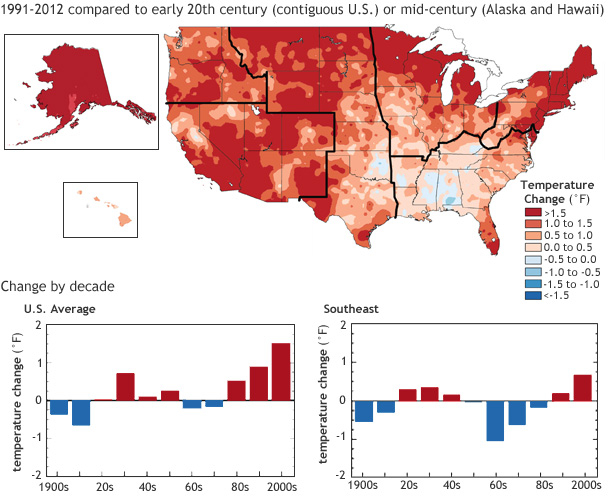 There is an industry of misinformation fueling climate change denial. It is often fairly sophisticated, and because it is dealing with a highly complex technical area, it’s easy to create an argument that sounds compelling. This results (as if often evidenced right here in the comments) in people who are confident that they are good skeptics and climate fearmongering is all nonsense. Of course they have to simultaneously believe in a rather absurd conspiracy theory regarding the scientific community, but they make that work somehow too.
There is an industry of misinformation fueling climate change denial. It is often fairly sophisticated, and because it is dealing with a highly complex technical area, it’s easy to create an argument that sounds compelling. This results (as if often evidenced right here in the comments) in people who are confident that they are good skeptics and climate fearmongering is all nonsense. Of course they have to simultaneously believe in a rather absurd conspiracy theory regarding the scientific community, but they make that work somehow too.
Here are a couple of recent examples, both of which involve some subtle cherry picking. The first has to do with electric cars, which are frequently opposed by the denialists, in that they oppose subsidies to help bootstrap the market. This involves the “solution aversion” aspect of climate change denial – deniers are really motivated by the proposed solutions to climate change, which goes against either their politics or other interests. The claim that is often made is that producing electric cars has a higher carbon footprint than gasoline cars, and that if you are charging your car off the grid you are probably getting that electricity from fossil fuels. Therefore – electric cars are worse for the environment.
At the very least, I see climate change deniers delight in how stupid this makes the climate change believers appear. This is a great example of cherry picking, because the two basic facts are correct but they are not the whole picture. Here, for example, is an article posted by Breitbart claiming that batteries are not green, concluding:
One of the authors, Mats-Ola Larsson at IVL, has made a calculation of how long you have to drive a petrol or diesel before it has released as much carbon dioxide as battery manufacturing has caused.
“The result was 2.7 years for a battery of the same size as the Nissan Leaf and 8.2 years for a battery of the Tesla-size.”
Truly the enduring mystery of why Tesla is now more highly valued than such non-Potemkin U.S. car manufacturers as Ford and General Motors grows more mysterious by the hour.
Continue Reading »
Jul
15
2019
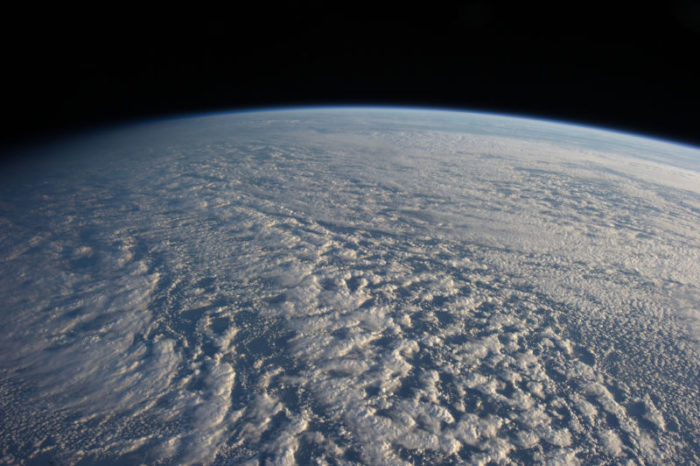 A paper is making the rounds on climate denial sites that claims to debunk human-caused climate change in a single stroke. Predictably, the paper does nothing of the sort, but it does raise a complex issue regarding climate change that is worth reviewing. But first let’s get to the paper itself.
A paper is making the rounds on climate denial sites that claims to debunk human-caused climate change in a single stroke. Predictably, the paper does nothing of the sort, but it does raise a complex issue regarding climate change that is worth reviewing. But first let’s get to the paper itself.
The paper, by J. Kauppinen and P. Malmi, is a pre-publication paper on the Arxiv. This means it is not peer-reviewed. Their central claim, from the abstract:
In this paper we will prove that GCM-models used in IPCC report AR5 fail to calculate the influences of the low cloud cover changes on the global temperature.
Right in the first sentence is a huge red flag – claiming to be able to “prove” that the IPCC report is false. That’s a bold claim, and suggests a less than rigorous intellectual approach. They also claim to rebuke a rather robust conclusion built on many lines of evidence with a single line of evidence – the single stroke approach. This is also a huge red flag.
The claim is built around one major line of reasoning, that if you compare low cloud cover with changes in global temperatures, you see a strong correlation. In fact, the authors argue, you can explain most of global warming as resulting from a decrease in low cloud cover, leaving almost nothing left for anthropogenic forcing. There is a great deal wrong with this claim. The site ClimateFeedback has helpfully curated much of the response from climate scientists, who eviscerate the Kauppinen paper, and I will give you a summary of their summary.
Continue Reading »
Mar
14
2019
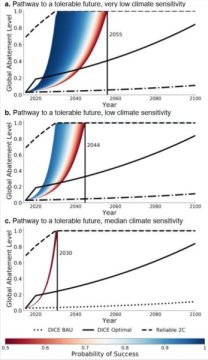 As a physician you have to develop a certain comfort level with uncertainty. The simple fact is – we don’t know everything. The human body is extremely complex, and there are over 7 billion people on the planet representing a great deal of variation. Our data is incomplete and largely statistical, and we have to apply that to specific decisions about an individual patient. This means we have to make the best recommendations we can with the information we have, be honest about our level of uncertainty, and convey the range of possible outcomes based on various decisions.
As a physician you have to develop a certain comfort level with uncertainty. The simple fact is – we don’t know everything. The human body is extremely complex, and there are over 7 billion people on the planet representing a great deal of variation. Our data is incomplete and largely statistical, and we have to apply that to specific decisions about an individual patient. This means we have to make the best recommendations we can with the information we have, be honest about our level of uncertainty, and convey the range of possible outcomes based on various decisions.
It’s often helpful to think in terms of “clinical pathways,” – what are the different possible paths an illness can take, given what we know and what we don’t know, and how will our diagnostic and therapeutic interventions alter those possible pathways?
Perhaps because I live this every day, I find it easy to accept the logic of action on climate change. We don’t know exactly what will happen. The climate system is complex, and there are known unknowns. One of the big ones is climate sensitivity – what is the precise relationship between the level of CO2 in the atmosphere and the degree of warming. The lower the climate sensitivity the better, in terms of how much warming will result from the CO2 we have and are releasing.
But there are other variables as well, including human action. We don’t know how stable the Greenland and Antarctic iceshelves really are, for example. There are multiple feedback loops and tipping points, and the potential for cascading effects. So yes – climate models are just that, models. They are not a crystal ball that will tell us what will happen. They are our best guess at what might happen.
Global warming deniers use this uncertainty as an excuse to do nothing (doing nothing always seems to be their goal, regardless of the justification). As a physician, that logic is painful. If I am not sure that my patient has a serious condition, that is not a reason to do nothing, it creates an imperative to do something. The specific intervention is then based largely on a risk vs benefit analysis. And often, as with global warming, acting early is key. You definitely want to find that tumor when it is small and before it has metastasized.
Continue Reading »
Feb
19
2019
 Climate change has altered the debate over the ethics of meat consumption, adding a new dimension that certainly changes the equation. There are also new options on the horizon, however, such as lab grown or cultured meat. How this will all shake out is still unknown, but it seems likely our meat consumption habits are going to be different in 50 years.
Climate change has altered the debate over the ethics of meat consumption, adding a new dimension that certainly changes the equation. There are also new options on the horizon, however, such as lab grown or cultured meat. How this will all shake out is still unknown, but it seems likely our meat consumption habits are going to be different in 50 years.
There are several issues to consider regarding meat consumption. One is simply the ethics of animal consumption. This one is a bit personal, and I don’t think there is any one answer. I personally advocate for humane animal treatment, but I do not think it is unethical to breed animals for consumption or to use their body parts for whatever purpose we like after they are dead. As long as their life is reasonably comfortable and their death painless and stress free, I don’t see an ethical issue.
This is essentially the position of Temple Grandin, who is a staunch advocate for animals rights but is not against meat consumption, she simply advocates for a system of animal handling from beginning to end which is humane.
A second issue is land use and the overall impact on the environment. Here the issues are perhaps ethically a bit clearer, but technically still complex. There is no question that growing meat requires more energy and more land and resources overall than plant consumption. However, there are many variables involved and depending on the details plants are not always more efficient.
Continue Reading »
Jan
28
2019
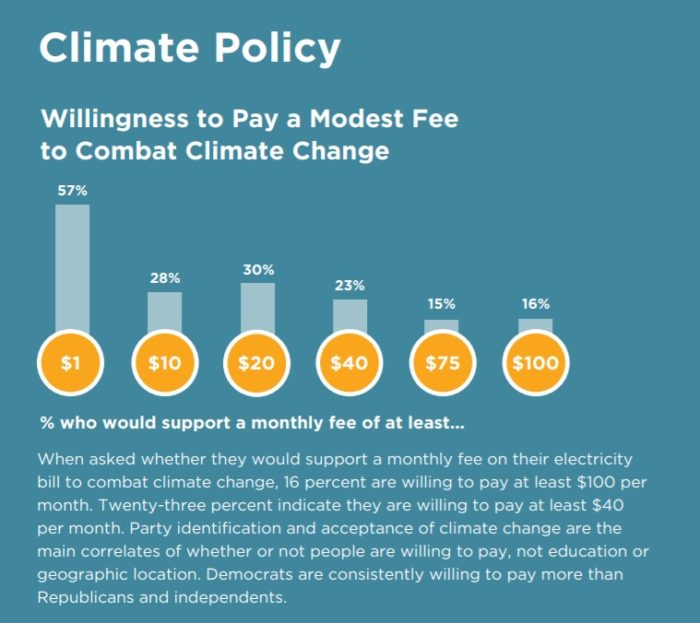 Climate change has certainly been a hot topic over the last year, so where do we stand in terms of public perception? Well – “The Energy Policy Institute at the University of Chicago and The AP-NORC Center conducted a national survey of 1,202 adults in November 2018 to explore Americans’ views on climate change, carbon tax and fuel efficiency standards.” Overall the survey suggests the public is inching toward greater acceptance of man-made climate change, but let’s delve into the numbers.
Climate change has certainly been a hot topic over the last year, so where do we stand in terms of public perception? Well – “The Energy Policy Institute at the University of Chicago and The AP-NORC Center conducted a national survey of 1,202 adults in November 2018 to explore Americans’ views on climate change, carbon tax and fuel efficiency standards.” Overall the survey suggests the public is inching toward greater acceptance of man-made climate change, but let’s delve into the numbers.
First, the majority of Americans, 71%, think that global warming is happening. Of those that think it is happening, 60% say it is mostly due to human activity, 12% that it is mostly natural, and 28% that it is evenly mixed. So that means that 62% (88% of 71%) of Americans accept anthropogenic climate change to some degree. That is a solid majority, but not as solid as the science or the consensus of scientists.
Predictably, these numbers vary dramatically according to political affiliation. For Democrats, the percent that believe global warming is happening and think that it is mostly or partly human-caused is 86/82. For independents the numbers are 70/64, and for Republicans its 52/37. So it seems that part of the problem is a knowledge deficit, for even among Democrats the rate of acceptance is lower than for the scientific community. But a larger part of this resistance is ideological.
For those who have recently changed their minds into accepting the reality of climate change (regardless of cause) 76% say it is because of recent extreme weather events, and 57% because of personal observations of local weather. Meanwhile, 63% say it is because of arguments in favor of climate change (they did not ask specifically about scientists or the scientific consensus). So essentially recent converts are relying more on anecdote than the science.
Things get more interesting when we get to questions about possible solutions to climate change. Previous research found that people who deny anthropogenic climate change were motivated primarily by “solution aversion” – they deny the problem because they don’t like the proposed solutions. This fits with much far right rhetoric, that climate change is a conspiracy by which liberals seek to expand the government and take control of the energy industry.
Continue Reading »
Jul
06
2018
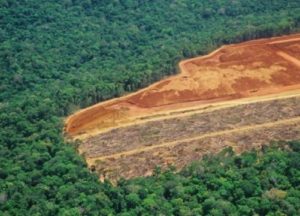 There is a strong scientific consensus that the primary driver of climate change is the release of previously sequestered carbon locked away in fossil fuels into the environment. But a new study reminds us that there is another contributor that must be accounted for in climate models – changes in land use.
There is a strong scientific consensus that the primary driver of climate change is the release of previously sequestered carbon locked away in fossil fuels into the environment. But a new study reminds us that there is another contributor that must be accounted for in climate models – changes in land use.
The core claim of climate change is actually quite simple, and has not been successfully refuted by climate change deniers. So-called “greenhouse gases” in the atmosphere warm the planet because they reflect more infrared radiation back down to the surface, so that less of it escapes the Earth. Without this effect the Earth would be a snowball.
It is irrefutable at this point that adding more greenhouse gases to the atmosphere will increase this effect, resulting in more warming. The only real question is – how much warming? This is where things become ridiculously complex. Climate scientists use models to predict what will happen as more CO2 is released into the atmosphere, but it is very difficult to model a complex system. This is why there are large error bars on projections of future warming.
As a quick aside, carbon dioxide (CO2) is not the only greenhouse gas, but it is the major one. Methane is a more potent greenhouse gas (GHG) than CO2, but it does not last as long in the atmosphere. Within the first 20 years after its release, methane is 84 times as potent a GHG than CO2, but only 34 times if you consider its effects over 100 years. Much less methane is released into the atmosphere than CO2, but it is not negligible and needs to be considered in climate models.
Continue Reading »
Nov
06
2017
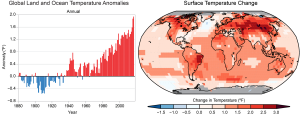 The U.S. Global Change Research Program Climate Science Special Report was recently published, and its conclusions are crystal clear:
The U.S. Global Change Research Program Climate Science Special Report was recently published, and its conclusions are crystal clear:
This assessment concludes, based on extensive evidence, that it is extremely likely that human activities, especially emissions of greenhouse gases, are the dominant cause of the observed warming since the mid-20th century. For the warming over the last century, there is no convincing alternative explanation supported by the extent of the observational evidence.
That conclusion is nothing new to those following the science of climate change for the last couple decades or so. The more this question is studied, the more data is gathered, the firmer the conclusion becomes – the planet is warming due to human release of greenhouse gases, such as CO2. There are error bars on how much warming, and the exact effects are hard to predict, but that’s it. The probable range of warming and effects are not good, however. It will be bad, the only real debate is about how bad and how fast.
The conclusions of the report, therefore, at least scientifically, are not surprising. It was, however, politically surprising. The special report began in 2015, under Obama. Because of Trump’s stated position that global warming is a Chinese hoax, and his appointment of many global warming deniers to key positions, it was feared that his administration would slow or frustrate the publication of this report.
However, according to the NYT, Trump himself was simply unaware of the report. Further, the fate of the report was largely in the hands of those amenable to following the science, rather than putting a huge political thumb on the scale. As a result the report was not hampered or altered. It was approved by 13 agencies who reviewed its findings.
Continue Reading »
 Here is a tiny bit of good news on the climate change front: A new analysis finds that there is more than enough storage space globally to fit the carbon we would need to capture and store if we wish to meet our climate change goals. The found:
Here is a tiny bit of good news on the climate change front: A new analysis finds that there is more than enough storage space globally to fit the carbon we would need to capture and store if we wish to meet our climate change goals. The found:
 It’s fun and interesting to look back over the last decade and think about what has happened and how far we have come. Round years are arbitrary, but it’s a sufficient trigger to take stock and hopefully gain some perspective on the medium course of history. There is a lot to say about the 2010s, and I may take the opportunity to say more, but I want to discuss in this essay what is perhaps our greatest challenge and disappointment over the last decade. In many ways this has been a lost decade for climate change mitigation.
It’s fun and interesting to look back over the last decade and think about what has happened and how far we have come. Round years are arbitrary, but it’s a sufficient trigger to take stock and hopefully gain some perspective on the medium course of history. There is a lot to say about the 2010s, and I may take the opportunity to say more, but I want to discuss in this essay what is perhaps our greatest challenge and disappointment over the last decade. In many ways this has been a lost decade for climate change mitigation. Have you ever traveled with a large group of friends? When a group gets beyond a certain “critical mass” it becomes geometrically more difficult to make decisions. Even going to a restaurant or a movie become laborious. Decision making seems to break down in large groups, especially if there isn’t an established hierarchy or process in place. That’s why the “by committee” cliche exists – group decision making can be a highly flawed and problematic process.
Have you ever traveled with a large group of friends? When a group gets beyond a certain “critical mass” it becomes geometrically more difficult to make decisions. Even going to a restaurant or a movie become laborious. Decision making seems to break down in large groups, especially if there isn’t an established hierarchy or process in place. That’s why the “by committee” cliche exists – group decision making can be a highly flawed and problematic process. There is an industry of misinformation fueling climate change denial. It is often fairly sophisticated, and because it is dealing with a highly complex technical area, it’s easy to create an argument that sounds compelling. This results (as if often evidenced right here in the comments) in people who are confident that they are good skeptics and climate fearmongering is all nonsense. Of course they have to simultaneously believe in a rather absurd conspiracy theory regarding the scientific community, but they make that work somehow too.
There is an industry of misinformation fueling climate change denial. It is often fairly sophisticated, and because it is dealing with a highly complex technical area, it’s easy to create an argument that sounds compelling. This results (as if often evidenced right here in the comments) in people who are confident that they are good skeptics and climate fearmongering is all nonsense. Of course they have to simultaneously believe in a rather absurd conspiracy theory regarding the scientific community, but they make that work somehow too. A
A As a physician you have to develop a certain comfort level with uncertainty. The simple fact is – we don’t know everything. The human body is extremely complex, and there are over 7 billion people on the planet representing a great deal of variation. Our data is incomplete and largely statistical, and we have to apply that to specific decisions about an individual patient. This means we have to make the best recommendations we can with the information we have, be honest about our level of uncertainty, and convey the range of possible outcomes based on various decisions.
As a physician you have to develop a certain comfort level with uncertainty. The simple fact is – we don’t know everything. The human body is extremely complex, and there are over 7 billion people on the planet representing a great deal of variation. Our data is incomplete and largely statistical, and we have to apply that to specific decisions about an individual patient. This means we have to make the best recommendations we can with the information we have, be honest about our level of uncertainty, and convey the range of possible outcomes based on various decisions. Climate change has altered the debate over the ethics of meat consumption, adding a new dimension that certainly changes the equation. There are also new options on the horizon, however, such as lab grown or cultured meat. How this will all shake out is still unknown, but it seems likely our meat consumption habits are going to be different in 50 years.
Climate change has altered the debate over the ethics of meat consumption, adding a new dimension that certainly changes the equation. There are also new options on the horizon, however, such as lab grown or cultured meat. How this will all shake out is still unknown, but it seems likely our meat consumption habits are going to be different in 50 years. Climate change has certainly been a hot topic over the last year, so where do we stand in terms of public perception? Well – “The Energy Policy Institute at the University of Chicago and The AP-NORC Center
Climate change has certainly been a hot topic over the last year, so where do we stand in terms of public perception? Well – “The Energy Policy Institute at the University of Chicago and The AP-NORC Center  There is a strong scientific consensus that the primary driver of climate change is the release of previously sequestered carbon locked away in fossil fuels into the environment.
There is a strong scientific consensus that the primary driver of climate change is the release of previously sequestered carbon locked away in fossil fuels into the environment.  The
The 




